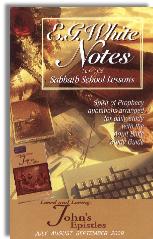|
||||||||||||||
Commentary on "Living as Children of God"
Day 3: Monday, August 10, 2009
Today's lesson, on 1st John 3:1-3 is titled “Results and Responsibilities,” the “results” being the promise that we will be like him and the “responsibilities” of being a child of God.
The question on today's lesson and the answers the Bible provides, like yesterda's lesson, cannot be understood apart from a proper understanding of bipartite (some would argue, tripartite) human nature. Before we get to that, let's first look at a statement in the first paragraph of the lesson. To quote the complete paragraph:
First John 3:1 is an introduction to the thoughts developed in the remainder of the passage for this week. It deals with results of this Father/child relationship, including subsequent responsibilities. As a consequence of their relationship with God, believers live pure lives not under the dominion of sin (vss. 3–10). However, first it is stressed that we will see Him and will be like Him.
Two ideas are captured in this paragraph. First, the responsibility of the child of God to “live pure lives.” The Christian is called to purity. It is also a fact that the Christian will deal with the fleshly desires brought about by the fact that we carry around a body that still attempts to conform to our old worldly patterns. Spiritually, we are not under the dominion of sin. It is our body (and brain, being a part of the body) that is the problem. Paul demonstrates in Romans chapter 7 the battle that is waging within the believer between the things one wants to do and the things that one actually does, a battle in which Paul finally exclaims in verse 24-25: “Wretched man that I am! Who will set me free from the body of this death? Thanks be to God through Jesus Christ our Lord! So then, on the one hand I myself with my mind am serving the law of God, but on the other, with my flesh the law of sin.”
Secondly, it is stated that “first it is stressed that we will see Him and will be like Him.” However, this promise found here in 1st John is not going to take place until Jesus returns. Resurrected believers will raise with a glorified body, translated believers will be changed in the twinkling of an eye. The Quarterly states that “first” we will see Him and be like Him. This is actually second. The first thing that happens in the believers life is that we are born again. Our spirit is brought back to life so that we are now sons and daughters of God, inhabiting sinful fleshly bodies. We will be fighting the natural tendencies of our flesh as long as we walk this earth, until the coming of our Lord Jesus. It is then that the promise of 1st John 3:2 occurs: “Beloved, now we are children of God, and it has not appeared as yet what we will be. We know that when He appears, we will be like Him, because we will see Him just as He is.”
It is our bodies that are awaiting the change. Our spirits have already been born again, but our bodies are still awaiting the transformation from earthly bodies, to glorified bodies, like the body Jesus has had since the resurrection.
The question in today's lesson asks:
What is the difference between Satan’s and Eve’s wish to be like God (Gen. 3:5, Isa. 14:14, Ezek. 28:2) and the promise of 1 John 3:2 that we will be like Him?
Satan's wish to be like God, according to the passages in Isaiah and Ezekiel, were to be above the Most High. They had to do with position and authority, not with what Satan tempted Eve with the knowledge of good and evil. The promise of Satan to Eve was a promise of “here and now.” The promise of 1st John 3:2 is a yet future event that all believers are eagerly awaiting. To compare and contrast Satan's promise with God's promise, for practical purposes, is irrelevant. On page 83 of the Teacher's Quarterly, it is also suggested that one discuss the difference of being “born of God” and being “born of the devil.” Focusing on qualities of Satan while discussing the qualities of the children of God can have disastrous consequences. They are two very different topics do not lend well to comparison or contrast. In the process, the child of God will be drawn down. This type of contrast may even be compared with the temptation with which Satan first approached Eve; the knowledge of good and evil. Up to that point, Eve only knew good. That was God's purpose for mankind, and that is God's purpose for the Christian.
Finally, at the bottom of the page the question is asked: “What’s your natural tendency, to be more like Christ or more like Satan?”
Again, the body/spirit duality that is present in the believer makes this question irrelevant, even dangerous. For a Christian to dwell on why he/she is more like Satan can have devastating consequences. As a believer, my spirit is hid with Christ in God. This is stated in Colossians 3:3: “For you have died and your life is hidden with Christ in God.” This is a present reality for the believer. We need not concern with the things of Satan.
In fact, one of most dire warnings in all the book of Revelation is in regards to the knowledge of the things of Satan. The church in Thyatira had tolerated the woman Jezebel, but not all have known these “deep things of Satan” as it says in Rev. 2:24: “But I say to you, the rest who are in Thyatira, who do not hold this teaching, who have not known the deep things of Satan, as they call them -- I place no other burden on you.”
With one mention of Christ, the paragraph at the bottom of page 80 of the Teacher's Quarterly is devoted to Satan. Avoid this type of study. 1st John 3:3 says, “And everyone who has this hope fixed on Him purifies himself, just as He is pure.” This hope is the promise of God that we will be like him when we see Jesus as he is. This is where our hope and attention must be fixed.
If you are already in Christ, purify yourself, fix your hope on the coming of the Lord when you will be changed to be like him.
Summary
- We will not be like Jesus physically until we see him at his second coming or at the resurrection. Until then, we are “hid with Christ in God” spiritually.
- Our natural tendency (our sinful flesh) is to rebel against God. To say that a Christian has a natural tendency to be like Satan is a statement of antichrist. In fact, since the Holy Spirit dwells within the believer, it is tantamount to blasphemy of the most serious kind.
- Excessive focus on the things of Satan is strongly forbidden by scripture.
- When we set our hope on his promise of being like him when we see him, we purify ourselves, just as he is pure (1st John 3:3)
Day 3: Monday, August 10, 2009
Overview: “That we will see the Lord and be like Him should fill us with joy and confidence and not a little bit of awe and wonder.”
Problems: Awe and wonder indeed! It is impossible to wrap our minds around the idea of an infinite God doing what He’s done for us, and all of it despite our open rebellion. And yet, it is all true. How could we not respond to such love!
The author also does a really nice job of contrasting Satan’s attitude and the attitude of a child of God in the regular quarterly section. Nothing says this better than his statement, “[Christians] respect the basic difference between Creator and creature and do not want to do away with it. For them the issue is love, not power.”
But then I read the Teacher’s Comments. Honestly, I begin to suspect that the author of the “regular” section is a different person than the one who wrote this:
First, “…If believers are going to be like Jesus when He comes (vs. 2), they must be like Him here.”
Second, “…A sanctified life is the sign that one is a child of God. Otherwise, there is no point in claiming that Jesus ‘appeared to take away sins.’ ”
Third, “…While Christians cannot claim perfection here on earth they must not continue to live in sin.”
So, as a believer, I must be like Jesus here on this earth? Nothing in Verse 2 says that. Here’s the verse: “Beloved, now we are children of God, and it has not appeared as yet what we will be. We know that when He appears, we will be like Him, because we will see Him just as He is.”
We ARE His children and we will be like Him BECAUSE we will see Him just as He is. We will not be like Him BEFORE we see Him.
As always, Adventists equate sanctification only with good behavior. Verse 3 states the truth. “And everyone who has this hope fixed on Him purifies himself, just as He is pure.” The key to purification is fixing our hope on Him. In fact, purification is the result of fixing our hope on Him, not result of our good behavior. This is no different than Jesus’ words in John 15: “Apart from Me you can do nothing.” We are called by Jesus to abide in Him, the vine. We are not to look at our, or anyone else’s, behavior and attempt to measure some level of sanctification from it.
To be sanctified means to be set apart for some purpose. My glasses are meant to help me see. They are sanctified when I wear them to do so. Our purpose is to abide in Jesus. We are sanctified when we do so. Our behavior is sometimes a result of this sanctification, but it is never the cause of it.
The third point above is irrelevant. Let me explain. No part of grace leads a person to sin by rejecting Jesus and, therefore, to behave sinfully. Paul dealt with this straw man argument on a regular basis. Legalists were always accusing him of excusing horrible behavior. The argument is patently false. Perusing Paul’s letters regarding this is left as an exercise for the reader.
Summary
- This is another example of Adventist double-mindedness. The “regular” portion of the lesson is really very good. It tells the truth and offers much encouragement.
- The Teacher’s Comments portion of the lesson is a lie. Not one of the three main points relating to this section is true.
Copyright 2008 BibleStudiesForAdventists.com. All rights reserved. Revised August 10, 2009. This website is published by Life Assurance Ministries, Glendale, Arizona, USA, the publisher of Proclamation! Magazine. Contact email: BibleStudiesForAdventists@gmail.com.
The Sabbath School Bible Study Guide and the corresponding E.G. White Notes are published by Pacific Press Publishing Association, which is owned and operated by the Seventh-day Adventist church. The current quarter's editions are pictured above.
Official Adventist Resources
Standard Edition Study Guide Week 7
Teacher's Edition Study Guide Week 7
Easy Reading Edition Study Guide Week 7
Search the Complete Published Ellen G. White Writings


